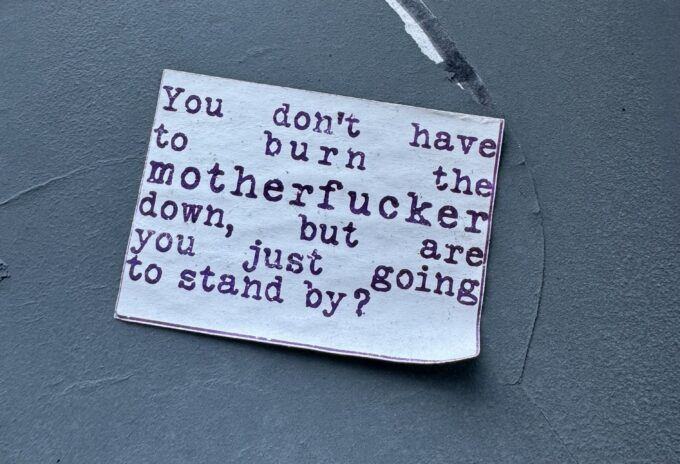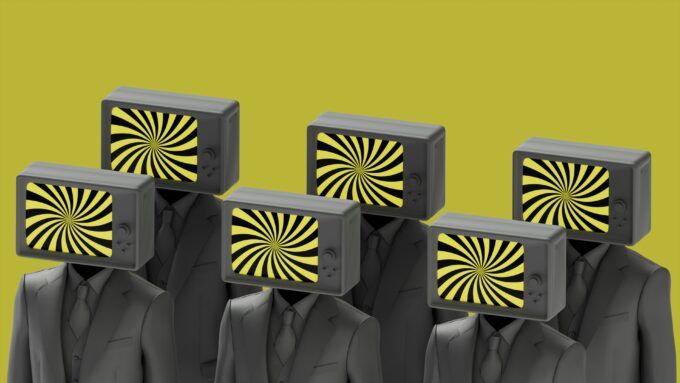 Published on http://www.Bad Subjects.org/
Published on http://www.Bad Subjects.org/
“Things fall apart; the centre cannot hold;
Mere anarchy is loosed upon the world.”
Wm. Butler Yeats, “The Second Coming”
“Things should start to get interesting right now.”
Bob Dylan, “Mississippi”
Yeats wrote “The Second Coming” in 1919, in the wake of the first World War, such a “Great War” that it plunged the world into a dark aftermath, a place where the center could no longer hold.
In the aftermath of Donald Trump’s election to the U.S. presidency, we can observe a divided view of the centre, one demographic envisioning collapse and retrogression with a President Trump at the center, another envisioning change and recuperation with the same man at the center.
Whatever common values and notion of the ways to “promote the general Welfare, whatever notion of an egalitarian civility once assumed had existed seem now to be falling very rapidly into disarray.
Whatever previously bound the country in a foundational acknowledgement of long respected authority seems now to be rapidly dissolving.
While Yeats was able to separate “the best lack all conviction” from “the worst are full of passionate intensity,” and anticipate clear recognition of “the best” and “the worst,” we no longer possess a nation-wide accepted taxonomy.
We had long assumed the existence of a mutual, nationwide understanding of our ideal egalitarian democracy, its historical roots forming one nation, indivisible, with liberty and justice for all.
We didn’t realize any part of this was so fragile until November 9, 2016.
Whether or not “mere anarchy is loosed” as the “New Norm” in American society, the days and months ahead will show but what we can now easily observe is that there are institutions, conditions, traditions, political parties, people, and realities and reasons that are perilously positioned, in a state of jeopardy.
Although what pops up first in any rational scrutiny is a falling apart of our own ecosystem, our own human triggered endangering of the truly awesome ways our planet sustains our human existence, this as yet remains a danger repressed in the American mass psyche.
Global warming was a danger never mentioned in any of the presidential debates, perhaps because it doesn’t have a pressing gravitas, perhaps because it’s not a personal choice that has any personal consequences, perhaps because, like the tobacco industry’s interest in keeping cancer out of their branding, Big Money manufactures and markets a “hoax” attitude in a demographic already denying the authority of science.
Science is not alone in those we now suspect of having no authority at all, of actually conspiring to deceive us. That list includes the authority of the Federal government, political parties and politics, The New York Times and all long form traditionally respected journalism and everything else that clashes with personal opinion.
The only reliable authority left at this psycho-political moment is your own hashtag analysis on Twitter. And Donald Trump’s.
Global warming, however, remains our greatest threat to human survival and will be pursued, here and everywhere when it becomes clearer as to what President Trump intends to do regarding international, national and state-wide attempts to mitigate global warming.
At this moment, there are four candidates about to implode on our psycho-political chart:
The Democratic Party, torn between a social and economic justice divide;
The Republican Party, facing a president who hopes to upend a Neoliberal faith in globalized trade;
The establishment media, which has been gutted by social media, and the President-elect, Donald Trump,
Trump;s self-implosion aptitude is astutely captured by Michael Moore:
“This is why we’re not going to have to suffer through four years of Donald J. Trump, because he has no ideology except the ideology of Donald J. Trump. And when you have a narcissist like that, who’s so narcissistic where it’s all about him, he will, maybe unintentionally, break laws.”
In a Counterpunch piece in March 2016, I supported a vote for Donald Trump if Bernie Sanders failed because I sought the self-implosion of a system that had clearly become plutocratic. I believed that the best and fastest way to get to an unsettling shake-up, as Slavoj Zizek referred to it, was to vote for Trump, because he was, as Michael Moore analyzed, wired to implode, because if you give someone real power who yet remains on that stage Freud termed polymorphous perversity, havoc will result.
I offer this: when Bernie fails, look to Trump to wreak havoc, raise hell and hackles. It is a risky enterprise but Trump is sure to continue shaking up the game for Neoliberals.
Those who now flock to Trump and are undeterred no matter what is said or done are driven to change the game, but it’s not the one Bernie Sanders is exposing. The passion Trump arouses is to be outside politics as usual; when troubling conditions remain opaque and confusing, the first impulse is to upend the table. Trump personifies that action.
Donald Trump then is a short circuit or a delay switch on the way to a Bastille like revolt. But Trump as president seems to be a sufficient detonator of a shock of recognition among both Democrats and Republicans that the entire U.S. are not happily gentrified dividend recipients.

Candidate Trump did not target the Yuge wealth divide that had shuffled money to the top gentrified quintile of the population and along with it, more power than a democracy could tolerate without slipping into plutocracy.
Two reasons for this failure: Trump is not so ideologically versed or tuned to offer this diagnosis and Trump himself is a plutocratic product and agent.
What he did run on was a message that received a gut response. He did not offer a point to point tutorial on the dangers of a Grand Canyon sized wealth divide, or on the elegance of a market rule. He ran with the message that the system was rigged against all those left behind by globalization, by the self-serving political party establishments conspiring against The People and Trump, and by the reign of President Obama, clearly to be continued by the reign of Hillary Clinton.
There are other entities standing on the horizon of implosion, those more vulnerable than the narcissist Trump’s psyche.
What I see now is a President Trump who would not be fixed, as Captain Ahab the megalomaniac was, on one aspiration but rather he would be dispersed and inattentive to all interests except those that fill a self-image he himself, paradoxically, cannot provide.
There is a neediness here that will have him reaching out, shape shifting, seeking a terrific reflection of himself in others.
This condition does not lead to a collapse of self but is sure to drive pre-Trumppolitics as we know it crazy.
In short, a Trump presidency is more liable to push the Republican Party to implosion than implode himself.
Fear is the initial trigger here, Republican Party fear of a man who could put the screws to quant hedge fund masters and billionaires, “full service” investment banks like Goldman Sachs and Morgan Stanley, and tax dodging U.S. corporations like Triton, Fruit of the Loom, and Playstar.
Trump could ransack the treasure troves of the investment houses, upend the Wall Street players, vaporize the hedge funds, stick it to the Big Banks, indict the plutocrats, seeks revenge on a moneyed class that threatens him now.
Not only will Paul Ryan’s magisterial project to establish a true Neoliberal order be mocked into ashes by the Executive of his own party but also mocked will be that party’s failure to detach itself from the monster of Ego, Wealth, and Prejudice that it has created. Dr. Victor Frankenstein’s rush to detach himself from his own creation is a fitting analogy for the Republican Party’s predicament here.
The party of con artists, the party that has managed to distract the Many from the root causes of their hardships, is here out-conned by a con artist unleashed from the primordial Id. This is the netherworld Republican politics has dwelt in since Reagan.
Because the Republican Party cannot fully be “Trump’s party,” there to continuously feed his need to be imaged as “terrific,” but must adhere to an ideology flown like a proud pennant since Reagan, they will be led by Trump to a schizoid state.
When forced by their own need to support a Republican president and their own need to support their ideology, Paul Ryan their Vladimir Lenin here, what results is a kind of political autoimmune condition wherein a body is targeted by its own defenses. Once Trump is introduced into the Republican system, he both preserves that system from Liberal power but also is programmed, by his very unstable nature, to disturb it, unsettle it, and perhaps lead it to implode, reappear, perhaps in the future as a party insulated against the ascent of another Know Nothing populist demagogue, a narcissist who is not quite sure he’s not an empty presence.
A President Trump’s success could be entwined in a Democratic Party success, a situation that would be yet further incite a Republican Party implosion. How would that happen? And is there an implosion scenario here for the Democratic Party?
Eight months ago, I wrote that if Bernie failed, look to Trump because he would be our next best bet to bring a return of economic justice, the kind we experienced in the U.S. from 1950-1980. Bernie would have tried legislatively and would have had a good chance of success if the Congress had gone Democratic also. If Bernie were now in the position Trump is, he would be facing a Congress owned by the Republicans and less likely to make good on his promises.
Trump, on the other hand, has a Republican Congress that must recognize that failure to support Trump confirms his supporters’ suspicion of Congress, political parties and all politicians.
Once again, rejection of key Trump issues, such as infrastructure spending and dismantling trade agreements, would push the Republican Party into implosion mode. To avoid that, they are not likely to reject any or all of what Trump proposes, even when they agree to what Obama has fought for and they have opposed. That entwinement of Republican with Democrat is itself a kinship that would cause a nervous breakdown for the Republican Party as it has defined itself since Reagan.
The Democratic Party’s entwinement in Trump’s regime would be, for half of that party, a kind of Vichy France capitulation.
Those most mourning Trump’s presidency do so for various reasons, climate change and Roe v. Wade perhaps being most significant. But what the results of the election showed us was that a large percentage of liberals had gotten so deep into non-economic issues that they could not see how the working and middle classes had been scheduled for extinction by market rule. They could not see the coming anger nor the why of it.
Social issue-minded Liberals have been divided in their everyday life, in their habits of heart, mind and purse, from a whole demography that Neoliberals had written off and Liberals left unchallenged, occupied as they were with rights, not economics.
Trump, the billionaire pitchman, did not write them off and pitched his carny tent in their heartland.
The strategy of pivoting away from wealth redistribution to social issues will lead to the Democratic Party’s own implosion.
The party’s own psychomachia, psychic battle within for dominance, pits a well-established faction whose issues attract the media like a shiny lure, most recently Black Lives Matter, police shootings, and LGBTQ rights, against an openly socialist leaning, brought to public attention by Bernie Sanders’s campaign, which places an equalizing of the wealth gap before all other issues.
The former has strong historical roots, from civil rights to Roe v. Wade, while the latter remains not only unclear but somehow a slippery slope toward Stalinism, a radicalization far removed from an American mass psyche yearning to be rich in an open arena of competition.
There is therefore a definite reluctance to level the rich as well as close down that perceived freedom of opportunity to be rich yourself.
Trump the campaigner has said much that would incite Liberals to recommit themselves to their identity and social politics.
He turned both this election season into a nasty street brawl, gave the media the entertainment it feeds on, and openly played all the cards of dark innuendo. He turned over and showed all the cards of racism and bigotry that have been Republican strategies to keep the game rigged.
He did not dog whistle; he used a loud speaker.
If Liberals follow their social issues first strategies, they will shout loudly and often President Trump’s failures to sustain advances in rights, from civil and women’ to LGBTQ. And in this, they may be co-opted by President Trump’s own ideology-free arbitrariness, his steerage toward a popular celebrity image, not that of an ogre.
Trump could rob the fire of a social issue minded Democratic Party in the way Bill Clinton robbed the fire of Republicans by undermining welfare, pushing trade globalization without caveats, and filling up privatized prisons with Black lives that didn’t seem to matter.
The last possible implosion is also prefigured in this election: mainstream media.
“The election of Donald J. Trump is perhaps the starkest illustration yet that across the planet, social networks are helping to fundamentally rewire human society. They have subsumed and gutted mainstream media.”
(
Farhad Manjoo, “Social Media’s Globe-Shaking Power,”
The New York Times,
Nov. 17, 2016)
In an interview with 60 Minutes, President-elect Trump said that he would not give up Twitter as the easiest way to reach the most people. He is now in a Twitter battle with The New York Times; his twitters vs. The Times long admired reportage.
Because we are at a moment when we face “a groundswell of public skepticism toward the establishment press, whose coziness with the White House was one of Mr. Trump’s talking points at rallies,” what President Trump says and where he says it will be the odds on favorite for whose truth will hold. (
Michael M. Grynbaum, “Presidential Press Pool May Be a Ritual Under Threat,”
NYTimes, Nov. 17, 2016) Social media rewires human minds first; the rewiring of society follows.
Thus, while there is no certainty in whether President Trump, the Republican Party or the Democratic Party will implode in the near future, our traditional and established press, whatever the platform, has already been “subsumed” and “gutted” by social networks.
This rewiring of human society has the “More Choices, Fewer Words, Faster Interactive Delivery, More Voices from the Fringe” admirers while others are unnerved by a Babel of self-authorized, often fake, often lunatic messaging serving as a dominant political discourse network. We are already in a place and a time where there are more Americans doing this messaging than there are observing from outside the cyber furor. We can say that the “outside” itself has imploded.
No print newspaper could run a front page banner “Trump Wins!” because that was old news. That messaging had to go up on the Times’ website, where its venerable print status as the paper of record, “The Gray Lady,” scrambled for eyeballs in cyberspace with real time streaming videos on YouTube and hashtags gone viral on Twitter.
Implosions may be phoenix-like and give birth to transformat














One Comment
Anthony Bernardo
I’ve always been a strong federal government advocate, with minimal state’s rights allowed. Either we’re part of the United States, or not. But this election has made me reconsider that stance because it’s clear we are not one United States, but no further towards that ideal than we were in 1787. If we were to realistically look at our history, we have only been one United States in time of war. In other times, we have not been united. I think that is what the Founders actually concluded themselves. It no longer works when some hacker in anywhere can render us impotent. Our greatest national security threat is now how we act on our Constitution, not some imagined threat to our Constitution